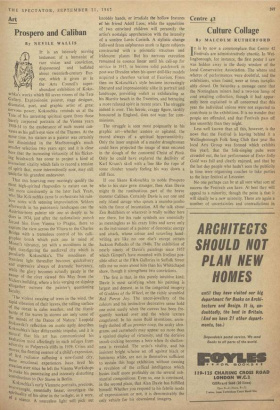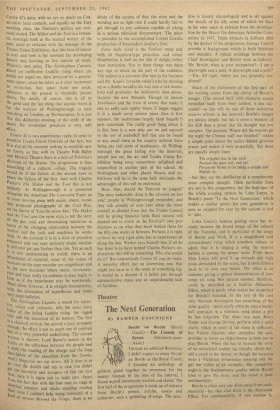Centre 42
Culture Collage
By MALCOLM RUTHERFORD
Iis by now a commonplace that Centre 42 'Festivals are administratively chaotic. In Wel- lingborough, for instance, the first poster I saw was hidden away in the dusty window of the local Conservative Association. The whens and wheres of performances were doubtful, and the exhibitions, when found, were at times inexplic- ably closed. On Saturday a message came that the Nottingham miners had a two-ton lump of coal awaiting collection, though it had appar- ently been explained to all concerned that this year the individual unions were not expected to contribute to the exhibitions. It is no wonder that people are offended, and that Festivals pass off less smoothly than they might.
Less well known than all this, however, is the news that the Festival is leaving behind it a Wellingborough Folk Song Club (last year the local Arts Group was formed which exhibits this year), that the folk-singing pubs were crowded out, the last performance of Enter Sally Gold was full and clearly enjoyed, and that by the last day people who hadn't seen the publicity in time were organising coaches to take parties to the later festival at Leicester.
No one perhaps can be at all sure what sort of success the Festivals can have. At best they will appeal to a minority, though the point is that it will ideally be a new minority. There are again a number of uncertainties and contradictions in THE SPECTATOR. SEPTEMBER 21 Centre 42's aims; with an eye no doubt on Con- servative local councils, and equally on the Tory working class, the Festival's politics are curi- ously muted. The Maker and the Tool is a roman- tic, nostalgic look at the manual worker of the Past, quite at variance with the message of the Trades Union Exhibition, that this time of labour Is over and now is the moment for developing leisure and learning to live outside of work. Wesker's own piece, The Nottingham Captain, about an ineffective Luddite rising where the rebels are urged on, then betrayed by a govern- rnent agent, could be taken as a clear incitement to revolution, but, apart from one aside, reference to the present is "markedly played down. No doubt, of course, this is all to the good and the last thing that anyone wants is for the workers of Wellingborough to start Marching on London, or Northampton. It is just that this deliberate stunting of the seeds of the desire for revolution produces a very odd effect.
Centre 42 is two experiments really. It seeks to establish Trades Union Festivals of the Arts, but it is also at the moment seeking to establish new art forms, so that with its Theatre Folk Ballet and Musical Theatre there is a hint of Polonius's divisions of the drama. The programme is then something of a cultural collage. The tragedy Would be if the failure of the second were to cause the failure of the first. And with Charles Parker's The Maker and the Tool this is not unlikely. At Wellingborough it is presented alongside the American The Lonesome Train, an at times moving piece with music. dance, words and projected photographs of the Civil War, on the theme of 'Lincoln never dies.' The Maker and the Tool uses the same style to tell the story of the gas, coal and shoemaking industries in terms of the changing relationship between the worker and the tools and machines he works With. At the moment it is in a state of primitive rehearsal and one may seriously doubt whether it will ever get any further than this. Yet as such tt is not uninteresting to watch; there is an abundance of material, some of the voices of workers on the tape recorder are magnificent and in the rare moments where music, movement, look and tape really co-ordinate it does begin to look as if the experiment may be worthwhile. with often, however, it is straight documentary, 141th the distraction of superfluous and some very inept balletic's.
The Nottingham Captain, a moral for narra-
;or, voices and orchestra, tells the same story 21v.ice of the failed Luddite rising, the rigged trial and the execution of its leaders. The first is a classical version, the second a jazz; strangely enough, the effect is not so much one of contrast but of a very powerful underlining. The second version is shorter; Lord Byron's speech in the Lords on the difference between the people and a"- Mob, the reading of the charge and the long description of the execution from the Gentle- 4" s Magazine are cut down. All it does is to 8° over the details and say in case you didn't time the enormity and savagery of this the first frille, here it is again just to make sure. Apart identical fact that with the four men on stage in
their sweaters and slacks standing reading kind teXts I couldn't help being reminded of a ..ind of serious Beyond the Fringe, there is no
doubt of the success of this; the story and the wording are so tight that it could hardly fail to get through to any audience capable of taking in a serious television documentary. The piece is preceded by the accomplished Covent Garden production of Stravinsky's Soldier's Tale.
Enter Sally Gold is the Festival romp and with its Stratford-type prostitute and comic blasphemies is well on the side of delight rather than instruction. Nor at these things was there any sign of shock on the part of the audience. The subject is a con-man (the best in the business and Mr. Kops's 'loveable swine') who by dressing up as a Rabbi tartuffes his way into a rich house- hold and proclaims the millionaire shoe manu- facturer the new Messiah. Though its intense Jewishness and the train of events that make it end so sadly and rightly where it began suggest it is a much more serious piece than it first appears, the undertones largely (and happily?) pass unnoticed. The really good thing about it is that here is a new play put on and enjoyed in the sort of makeshift hall that can be found in any small town in the country without there being any real sense of inadequacy. At Welling- borough the great failing was the intervals; people just sat, the art and Trades Union Ex- hibition being away somewhere unlighted and unspecified in another part of the school. At Nottingham and other places theatre and ex- hibitions will be in the same hall; obviously the advantages of this will be enormous.
How, then, should the Festivals be judged? The most noticeable thing is the advance on last year; people in Wellingborough remember, and they talk already of next year when the town council as distinct from just the Trades Council will be giving financial help. Real success will depend not so much on the Festival's own pro- ductions as on what they leave behind them for the fifty-one weeks in between. Perhaps it is right to have no very rigid aims, but to experiment all along the line. Wesker says himself that if all he has done is to have helped Charles Parker's ex- plorations this will be something. Who else would do it? But undoubtedly Centre 42 can do more. A minority effect, but an interesting one, that might just have in it the seeds of something big. It would be a disaster if it failed just through administrative chaos and an unpardonable lack of facilities.











































 Previous page
Previous page